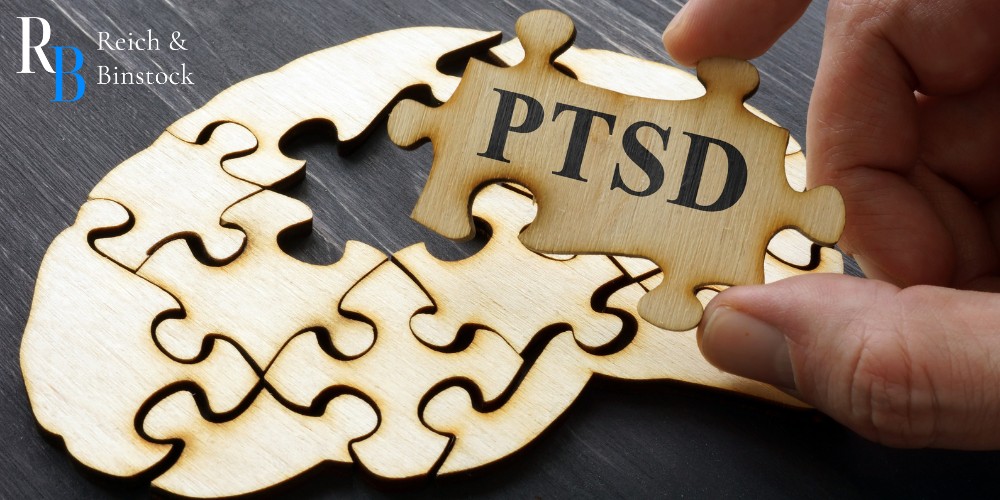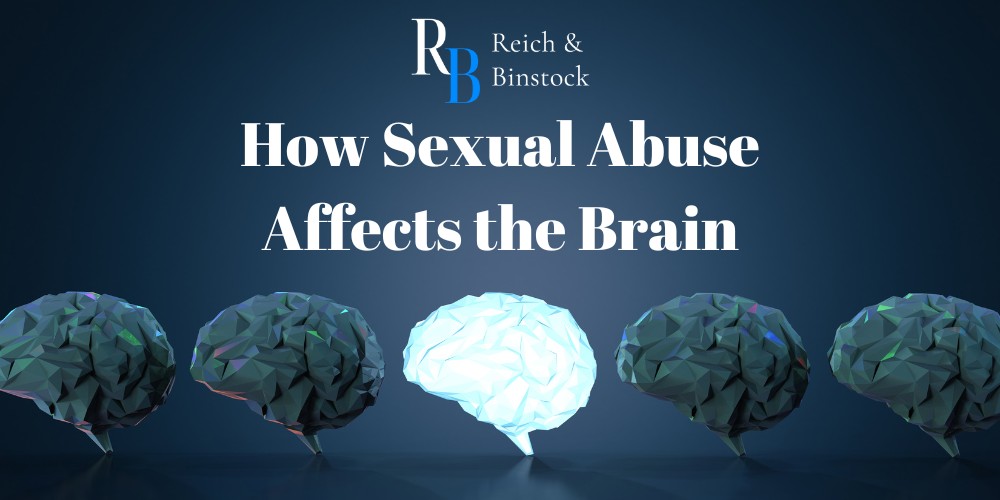Adult and childhood sexual abuse can occur to anyone, almost anywhere. In many cases, sexual assault and abuse don’t happen as seen on television shows and in movies. Unfortunately, many sexual abuse victims know their abuser in some way. Regardless of how, when, where, or by whom the abuse occurred, these incidents can potentially affect the brain in major ways. In this blog, the sexual abuse lawyers at Reich & Binstock outline how sexual abuse affects the brain and how you can seek compensation for your suffering.
At Reich & Binstock, our nationally-recognized team has advocated for sexual assault victims in civil lawsuits against their abusers. Even if your abuser is not convicted in their criminal case, you can file a lawsuit against them to seek compensation. To learn more about your rights as an abuse survivor, contact Reich & Binstock at 713-622-7271 to schedule your free consultation.
What Is Sexual Abuse?
Sexual abuse is a widespread issue that many men, women, and children face daily. Anyone can experience sexual abuse, regardless of age, gender, or sexual orientation. Sexual abuse is any sexual activity that happens without someone’s consent. Many actions can fall under the umbrella of sexual abuse, including the following actions.
- Unwanted touching or kissing
- Attempted or completed rape
- Any unwanted sexual activity
- Refusing to use birth control or not allowing another person to use birth control
- Engaging in sexual contact with someone who cannot give clear consent (such as someone who is unconscious)
- Pressuring someone into sexual activity
- Any sexual activity with a child
- Exposing someone to pornography without their consent
Both physical and non-physical actions can be forms of sexual violence. Sexual abuse in adults occurs when sexual acts are performed or attempted without consent. Childhood sexual abuse occurs when any form of sexual contact is attempted or performed with a child.
Regardless of whether someone suffers adult or childhood sexual trauma, this experience can greatly affect their mental or physical health for years to come.
How Does Sexual Abuse Affect the Brain?

Changes to the brain occur both during and after someone is sexually assaulted. When such a traumatic experience happens, the sympathetic nervous system of the body will release stress hormones. These stress hormones prepare the body for fight, flight, or freeze. In other words, the victim is trying to survive the experience rather than process everything that happens.
For sexual assault survivors, the changes in their brains begin after the traumatic experience. These changes are similar to the changes that occur in combat survivors who struggle with post-traumatic stress disorder (PTSD). The sympathetic nervous system continues to release stress hormones even after the traumatic event. This results in fatigue of both the body and mind of the survivor.
In the following sections, we go into even further detail about how sexual abuse affects the brain.
The Physical Changes in the Brain
As we mentioned before, the body remains in “fight or flight” mode after the traumatic event ends. At the same time, the brain undergoes certain physical changes in the following areas.
Changes in the Amygdala
The amygdala is a small portion of the brain that regulates emotions, motivation, and emotional behaviors. Sexual abuse victims experience changes to the amygdala when it is overstimulated from the constant stress response of the body. This overstimulation leads to associating certain emotions with the traumatic experience they endured.
Victims may find themselves identifying innocuous situations as dangerous ones. This comes from the overstimulation and hypervigilance generated by the amygdala. Both situations and people can be identified as dangerous even when they are not.
Changes in the Hippocampus
The hippocampus is responsible for learning, forming new memories, and storing long-term memories. Contrary to the amygdala, the hippocampus actually becomes less active after sexual trauma occurs. The hormones released by the amygdala as a stress response kill the hippocampus cells.
As these cells die, the brain’s ability to solidify memories weakens. This makes it more difficult to recognize that the abuse happened in the past and that it is not an active threat.
Changes in the Prefrontal Cortex
The prefrontal cortex is the last portion of the brain to develop in people, only fully developing in young adulthood. It regulates thoughts, memories, personality, social behaviors, decision-making, impulse control, and much more. It also interacts extensively with other brain regions to help the brain structures function properly.
Sexual abuse victims often remain hypervigilant after the traumatic incident occurs. This can lead to paranoia, memory problems, poor academic performance, and so much more.
Changes in Neurotransmitters
A recent study from 2017 also linked sexual trauma with changes in neurotransmitters of the brain, such as dopamine and serotonin. This trauma may also lead to hormonal imbalances from disruptions to the hypothalamic-pituitary-adrenal axis (HPA axis). The HPA axis is an important structure that regulates the body’s stress reactions. It is also important in functions such as digestion, emotional health, sexuality, immune health, and more.
Therefore, many survivors of sexual violence have difficulty with chronic fear, nightmares, cognition, mood swings, chronic fatigue, and much more. In other words, adult or childhood abuse does more than affect the victim physically. Sexual assault leaves many victims with permanent cognitive changes that affect them for the rest of their lives.
The Development of PTSD

While not every survivor of sexual assault will develop post-traumatic stress disorder (PTSD), it is a common aftereffect of assault. PTSD itself can cause changes in the human brain that affect the prefrontal cortex, amygdala, and hippocampus. All three of these brain structures are involved in the body’s stress response.
Many victims with PTSD from sexual assault struggle with severe anxiety, severe depression, panic attacks, and even chronic pain in the physical areas affected by the assault. As a result, these victims may relive their trauma for years. Just to live their everyday lives, they may need consistent medication and therapy, which can be expensive.
Symptoms of PTSD
PTSD symptoms often affect both the brain and the body. Although the symptoms vary based on the person and the traumatic experience, common PTSD symptoms include the following.
- Fear
- Severe anxiety
- Detachment from one’s body or from reality
- Flashbacks or intrusive thoughts
- Difficulty concentrating
- Recurring nightmares
- Hyper- or hyposexuality
- Social withdrawal and relationship problems
- Self-harm
- Suicidal thoughts
- Avoidance of anything that reminds them of the trauma
- Low self-worth
- Sleeping problems
Importantly, not every person who develops PTSD is a survivor of sexual abuse, and not every abuse survivor will develop PTSD. PTSD affects everyone differently, and the above list of symptoms is far from exhaustive.
How Common Is PTSD in Sexual Abuse Survivors?
According to research from the University of Washington School of Medicine, 75% of survivors of sexual abuse meet the criteria for PTSD one month after the abuse. This is the earliest point at which one can be diagnosed with PTSD. Even after three months, more than half (54%) of survivors still met the criteria for PTSD.
Other Health Conditions Related to Sexual Abuse

Many physical and mental health conditions can arise for survivors of sexual abuse other than PTSD. Examples include STIs (sexually transmitted infections), substance abuse, eating disorders, sleeping disorders, and more. Two of the most common mental health problems that arise from sexual abuse are anxiety and depression.
Anxiety
Anxiety is another condition that can result from changes in the cognitive function of the brain after abuse occurs. Constant fear and worry are common for survivors of abuse. They may experience extreme fear in public places, panic attacks, or lingering anxiety disorders.
Depression
Depression is a type of mood disorder that develops if feelings of sadness or hopelessness continue for long periods. They even interrupt one’s normal patterns of thought. Many survivors struggle with depression long after the traumatic experiences occurred.
Other Mental Health Issues
Many other mental health problems can develop in survivors of sexual assault. Survivors of sexual trauma often have an increased risk of suffering from the following conditions.
- Personality disorders
- Somatic disorders
- Gender and sexuality problems
- Issues with body image
- Eating disorders
- Chronic depression or anxiety
- Addiction and substance abuse
- Schizophrenia
How Can Someone Heal from Sexual Abuse?

Healing from sexual abuse can be a long, difficult journey for victims. In most cases, sexual abuse survivors will need professional help, and possibly medication to manage their symptoms. This is absolutely nothing to feel ashamed of. Victims of sexual abuse have survived very serious trauma, but modern medicine provides many options for helping them cope and heal.
The main goal of many support groups, therapy sessions, and medications is to help the victim move out of survival mode. Trauma therapy from a licensed professional has helped many victims regain the feelings of safety the abuse took from them. If you have suffered from sexual abuse of any kind, seeing a mental health professional is likely in your best interest.
Can You Sue for Sexual Abuse?
Yes. Many survivors don’t know this, but you can file a civil lawsuit against your abuser for compensation. Even if they were not convicted of a sex crime, you can sue your abuser for compensatory damages and, in rare cases, punitive damages. Victims may be able to recover the following compensation.
- Lost wages
- Medical bills
- Mental health counseling and medication
- Pain and suffering
- Scarring
- Anxiety
- Insomnia
- Emotional distress
- Loss of enjoyment of life
- Loss of earning capacity
Contact the Sexual Abuse Lawyers at Reich & Binstock Today
If you experienced trauma in the form of sexual abuse, you may be able to hold your abuser accountable in a civil lawsuit. The experienced sexual abuse attorneys at Reich & Binstock are dedicated to representing victims in their cases and holding their abusers accountable. Nobody should have to suffer in silence, and we want to ensure that your voice is heard. To schedule a free consultation with a compassionate personal injury lawyer, please call our office at 713-622-7271 today.













